A Hands-on, Elbow-Deep Immersion Into The Soul of Bolognese Cooking
In a private kitchen, we created memories that lasted long after the plates had been cleared, the wine glasses had been emptied, and the kitchen lights had been turned off.
Bologna. The beating heart of Emilia-Romagna, was a city that has long been the culinary capital of Italy, and just maybe, the entire world. It’s a place where food was a religion, a way of life, and so deeply connected to the culture that it was nearly the reason for being. My train rolled into Bologna as the sun just began to dip below the crowning terracotta rooftops. It cast long shadows across the ancient city and emphasized the streets and alleys in every direction. I stepped onto the platform, my bag limply slung over my shoulder. The smell of diesel, train station espresso, and a somewhat distant promise of a good meal filled my nostrils.
I walked down Via Indipendenza, the main artery that connected the train station to the Bologna’s historic center. The street was bustling with the evening passeggiata. Locals and tourists alike were strolling arm in arm, stopping for a bit of window shopping, or simply just enjoying the moment, as prescribed by the famous Italian phrase—“la dolce far niente". The warm glow of the setting sun illuminated centuries-old porticos and arches in a rhythmic play of light and shadow. I was visiting Bologna to spend some time in the kitchen of my old friend Federico, who was right at this moment warming up his kitchen, preparing it for us to cook up a storm, diving headfirst into the heart of Bolognese cuisine.
Federico's building was the perfect example of Bologna's rich history and stunning architecture. It had a weathered facade that told countless stories of its residents. There were cracks along the sides of the building that held the memory of the laughter that echoed through the narrow halls. There were patches of paint that were marks of lives that were lived fully and without apology in this timeless city of leaning towers. I strolled up to the main entrance and rang the bell. The buzzing sound could be heard outside, echoing from upstairs in a loud and attention-grabbing shudder. My finger left a slight impression in the decades of grime accumulated on the brass button as I withdrew it. I waited for a brief moment, and then heard the very familiar buzzing of the door that was opened for me remotely. I began my ascent up the narrow staircase, each step creating an echo through the stone hallways, as my footsteps announced my arrival to every resident in the centuries-old apartment building.
I trudged up the stone steps one by one, finally reaching the top of the old landing. Federico greeted me with a warm embrace and a glass of Sangiovese, as I expected that he would. Whenever it was dinner time, you could always find him in his kitchen, a glass of some Italian varietal in hand, while his other hand was busy stirring something in a pot. As I reached to greet him and accepted his warm embrace, I immediately had a glass of wine in my hand as well, forced vigorously into my palm by Federico. “You must try,” he said. From Federico, it was more of a commandment than a suggestion. I took a quick sip as we laughed, and marveled at the texture of this particular Sangiovese. It was rich. It was earthy. I was pure silk in a glass. And, it was a fantastic apéritif before the gastronomic indulgence for the evening. "Benvenuto, amico mio," he exclaimed as his eyes crinkled with genuine joy. Without missing a beat, he produced an apron. From where, I will never know. He shoved it into my other open hand and gestured for me to dive right into the heart of the his kitchen. This evening’s dinner wasn’t going to be at some restaurant. It was wasn't going to be some stuffy, formal affair. There would be no counting of Michelin Stars or complex menus filled with tastings. Instead, this was going to be a hands-on, elbow-deep immersion into the soul of Bolognese cooking, led by Federico’s expertise and passion for the craft.
I set my glass of Sangiovese down on the counter, as Federico raised an eyebrow. “I am not as good one-handed like you,” I explained. This only made him laugh even more. I set my bag down on the end table and dove in to make the local ragù which was on Federico’s menu this evening. This was a meat sauce that to the uninitiated, might seem like a simple creation. This is where you’d be mistaken. How wrong you would be in your assumption! This was not your fake nonna's tomato-based slop from a jar purchased from any one of thousands of grocery stores around the world. Instead, this sauce was a rich, complex symphony of flavors, textures and aromas. It was a recipe that had been perfected over generations of Bolognese le nonne, each family guarding their recipe like a state secret. Even if you had the opportunity to ask for the ingredients in person after praising the meal, it was a well known tactic around the Nonna community to leave out a key ingredient when providing any recipe to anyone who was NOT in the family.
As Federico was leading this masterclass, he instructed me to chop onions, celery, and carrots with his watchful eyes criticizing my cutting techniques as he continued to sip on his glass of wine. My knife work was as meditative as my train ride. Each rhythmic chop creating a staccato of ticks that echoed around the kitchen. Federico made sure to correct my cutting as these were not rough chunks destined for some rustic stew. These cuts had to be finely diced morsels that would melt into the sauce and create a foundation of flavor that was experienced rather than seen.
I turned my attention to the pot, already preheated on the stove by my instructor. Federico tossed a generous knob of butter into it as it melted and sizzled. It released an aroma that was welcoming, warm and inviting. It was the kind of smell that reminded me of my grandmother's kitchen. The kind or aroma that kicked you in your appetite the moment you caught wind of it. I slid my chopped vegetable trinity right into the golden pool in the pan, followed quickly by ground veal and salty, diced bacon. The sound of meat that hit the hot butter was a universal language, understood by chefs from all over the world. It was like a stovetop symphony of sound and flavor instantly grabbing at your tastebuds, your hopes, and your dreams.
As I stirred slowly, waiting for everything to melt together in the pot, Federico took the time to hand me my glass of wine and gave me some valuable cooking points. "You'll notice we don't use olive oil," he said. "It's not that we don't love it, because in Italy, how do you NOT use olive oil?! But historically, oil was expensive. So, our Nonne learned to make do without it. And by not using olive oil in the ragù, they created something that was singularly and uniquely Bolognese." It was really extraordinary to think that some of the world's greatest dishes were born out of necessity instead of affordability.
The aroma of the simmering ragù was intoxicating. It filled the kitchen with a flavor and scent that could make any guest feel right at home, and any neighbor knock on the door and invite themselves to dinner. “While this is cooking,” Federico said, “let’s make the pasta. And tonight, we’re going to make the Pappardelle. Because, they are wide. They are luxurious ribbons that were made to clinging to the rich, meaty sauces, like you are making tonight.” Federico cleared a space on his worn wooden table, as he poured a small mountain of flour on the surface, creating a well in the center with such practiced ease, he never even looked down as he did it. I cascaded a group of preprepared golden egg yolks right into the heart of that crater. With a fork, Federico told me to slowly incorporate the flour into the eggs, as he monitored my progress, nodding in approval.
Like medieval alchemy, the mixtures began to come together. I placed my fork to the side, and slid my fingers into the dough. Working the dough felt almost primal, old, timely. It was a shaggy mess that transform right in front of my eyes into a smooth, elastic ball. I kneaded and stretched it. Folded and pressed it. Once the dough reached that perfect consistency that made Federico smile and actually set his wine glass down, he wrapped the dough in plastic and let it rest. "Now," Federico said as he picked up his glass, "we've earned ourselves a glass of wine, don't you think?" As I was his guest, there was no need to argue with such impeccable logic. We leaned back against the counter, sipped our Sangiovese, as Federico chatted passionately about his business. “I love my restaurant, but I also wanted to bring people back to the heart of Italian cooking," he said. “I wanted guests to step away the Michelin Stars and the tourist traps. People travel from all over the world to come here, to Italy. Why are they going to a restaurant? Italian food started here, in kitchens like mine. Here, in my home, everyone—we all cook together. I am the chef, but we all learn together. And then, we eat together. This is how Italian food, especially Bolognese food, should be experienced."
There was no arguing with his statement. We toasted and laughed as I looked around Federico’s dining room. In a world of Instagram-worthy plates. molecular gastronomy, overpriced Michelin menus and tasting menus that would have you splitting at the seams at the end of the dinner, there was something refreshingly honest about Federico’s approach. His kitchen in his home wasn't about impressing diners with fancy techniques or obscure ingredients. He wasn’t trying not to create an Instagram-moment for an influencer. Federico was creating connection in his home and his kitchen. It was a connection to the Bolognese food. To the Bolognese culture. And to the Bolognese people of Italy.
Federico set his wine down and retrieved a well-worn pasta machine from a kitchen cupboard. He patted it like a well-behaved child as he set it on the countertop. We divided the dough into manageable portions and began the process of rolling and cutting it. The first pass through the machine was the most difficult. But, with each subsequent pass, the dough eased and became more pliable, stretching into thin sheets of Italian goodness. As I mentioned before, this was a transformation bordering on the alchemical. We took a little flour and few eggs and right in front of our eyes, we stared at silken sheets glorious pasta, ready to be cut into ribbons. As we hand cut the pappardelle, we draped the ribbons over the backs of Federico’s chairs, creating a pasta curtain that would have made any Italian Nonna beam with pride, and squeeze our cheeks violently in happiness.
As Federico tended to the cooking pasta, I checked on the bubbling ragù. I lifted the lid and releasing a cloud of aromatic steam that made my mouth water instantly and involuntarily. Federico turned his head and nodded approvingly in my direction. With practiced ease, Federico dropped the pappardelle into a pot of boiling, well-salted water. “The pasta water should taste like the Mediterranean Sea. It's your only chance to season the pasta itself." After a few minutes - definitely far fewer than you'd expect for dried pasta, Federico fished out a strand and tested it between his teeth. "Al dente," he declared, "Let's finish it in the sauce." He instructed me to add a splash of the pasta cooking water to the sauce. "This starchy water," he explained. “This, is every Italian kitchen’s secret to bringing the sauce and pasta together into a happy marriage. It's like an Italian culinary glue. If you don’t do this, your pasta will taste like it was from a can. And then, every Nonna in Italy will order a hit on you,” he laughed, taking a sip from his wine glass.
I transferred the pasta directly from the water into the pot of ragù. The noodles glistened and melted into the pot as steam rose when they merged with the sauce. With a few expert tosses, the pappardelle was fully coated, the sauce clinging to every ridge and crevice. It was a beautiful sight on the stove, and an even more enticing aroma as it floated out of the open kitchen window. We plated our creation as I marveled at the simplicity of this entire recipe. There were no fancy garnishes. There were no artful smears of sauce on the plate. There were no table runners or sommeliers to see in the room. There was just a generous mound of pasta, perfectly sauced, with a light dusting of Parmigiano-Reggiano. It was honest. It was unpretentious. It was beautiful. As expected, there was a knock on the door before we even took our plates to the table. It was Federico's neighbor. Clearly he had smelled what we were cooking and had brought an empty plate over to fill and take back to his apartment. But instead, Federico welcomed him inside, taking his plate and replacing his neighbor’s empty hand with a glass of Sangiovese.
We all carried our plates to a small table near the window, setting them down and pulling out the chairs to sit. The last rays of the setting Italian sun painted the sky in hues of orange and pink. It splashed across the terra-cotta rooftops and the warm, yellow and orange buildings. We took a moment to toast and sip the wine from our glasses. We twirled our forks, gathering up that first perfect bite. The pasta was indeed perfectly al dente, as Federico said. It provided just the right amount of resistance in every chew. The ragù was rich and complex. Even as simple as the ingratiates were, each component was distinct yet harmonious. The veal was so tender, it practically melted into the sauce that stuck to the pappardelle. The bacon added a subtle smokiness to the whole dish. Surprisingly, the vegetables had melted into the background and provided a sweet, earthy foundation for the pasta. This simple yet elegant dish was honestly one of the best things that I had ever eaten. In that moment when I tasted my and Federico’s labor and creation, I instantly felt a sense of connection. It was not only to the food that Federico and I cooked in his kitchen, but it was also to the generations of Bolognese who had sat down to similar meals throughout history. A connection to the Nonne, the cooks of the family who kept their recipes a family secret. Who passed down their knowledge to their children as dinners were crafted with love and attention from one Italian kitchen to another.
The sun dipped below the horizon, casting long shadows across the ancient city. In a world that often felt increasingly disconnected, Instragramed and commercialized, where meals were rushed, tables were turned, and no time was given to actually understand the creation of the dish, Federico's approach felt like a radical act of rebellion in a town full of Michelin Star marvels. By inviting people into his home. By teaching his patrons and guests to cook with their hands and their hearts, Federico was preserving something of Bologna that was more precious than gold. He was reminding us that food was more than an Instagram like. It was more than a quick bite or a check mark on an experience. Instead, it was a way to connect with others. To share in an experience and in a culture. And to perhaps create memories that lasted long after the plates had been cleared, the wine glasses had been emptied, and the kitchen lights had been turned off. This dinner was a window into the soul of Bologna, a city that had elevated food to an art form.

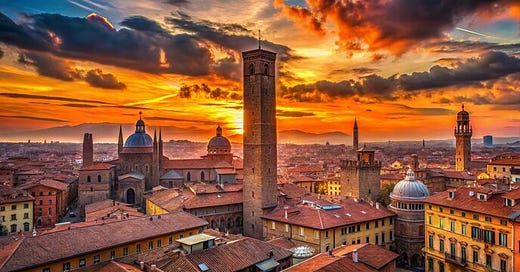



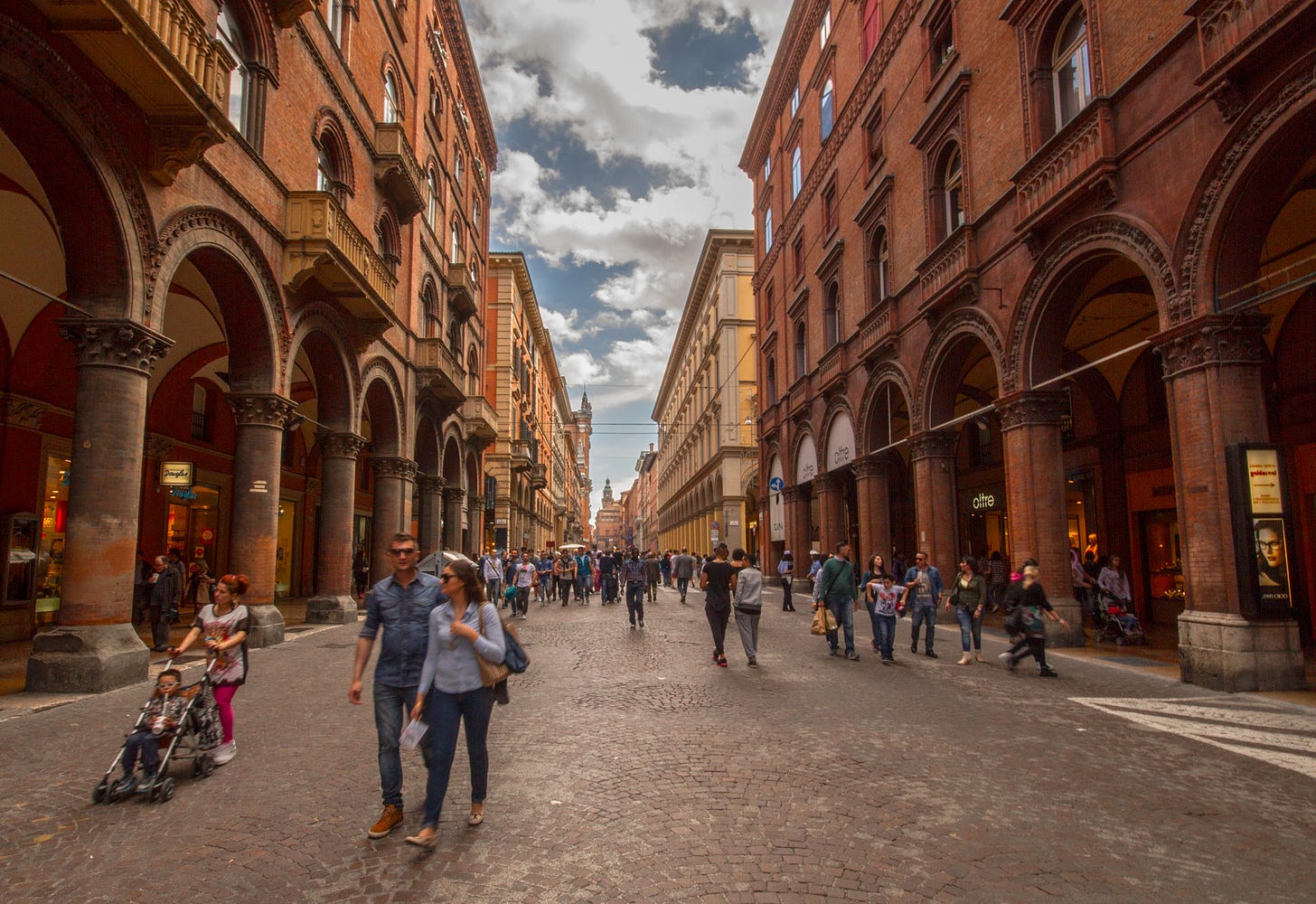
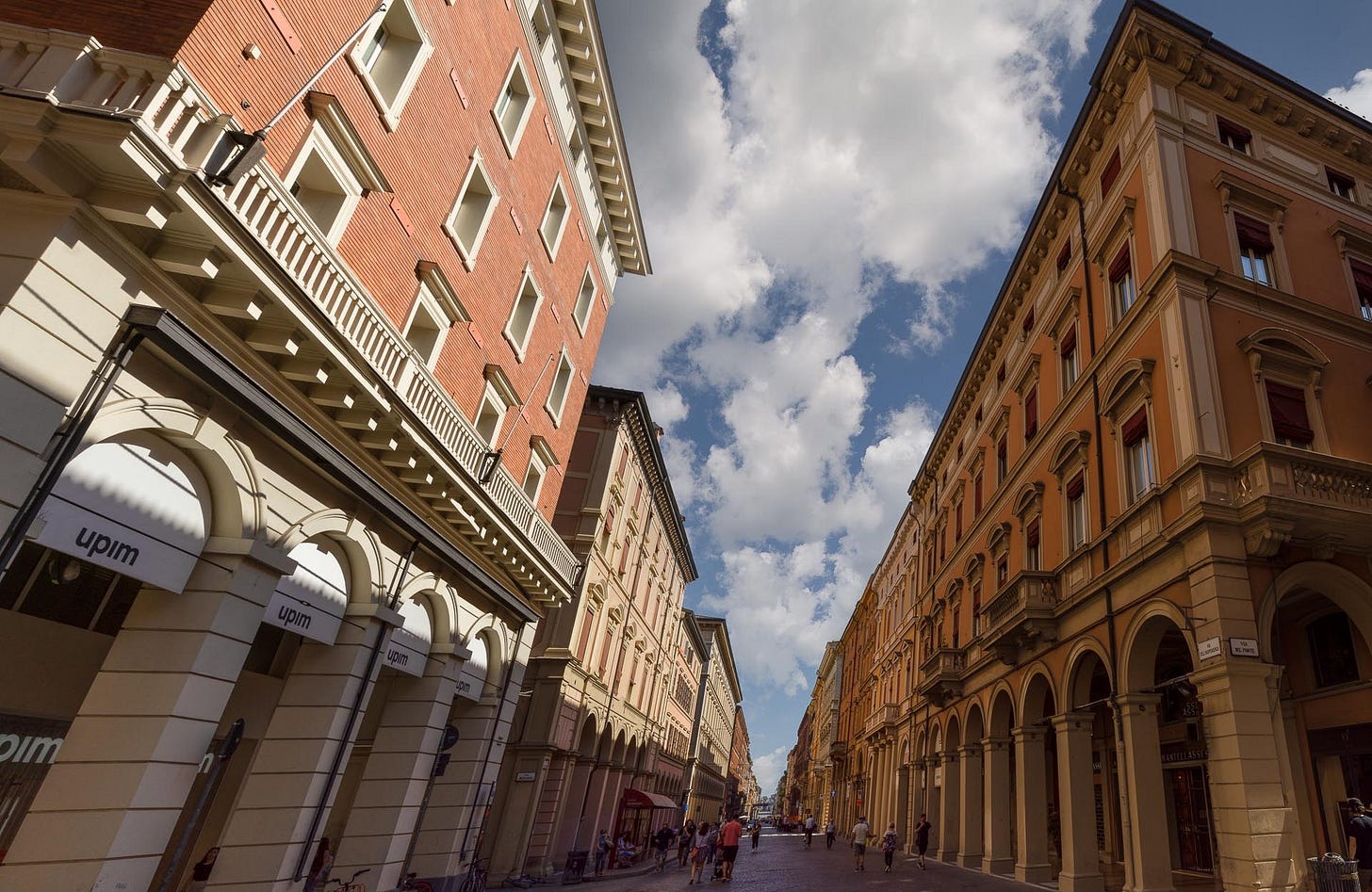



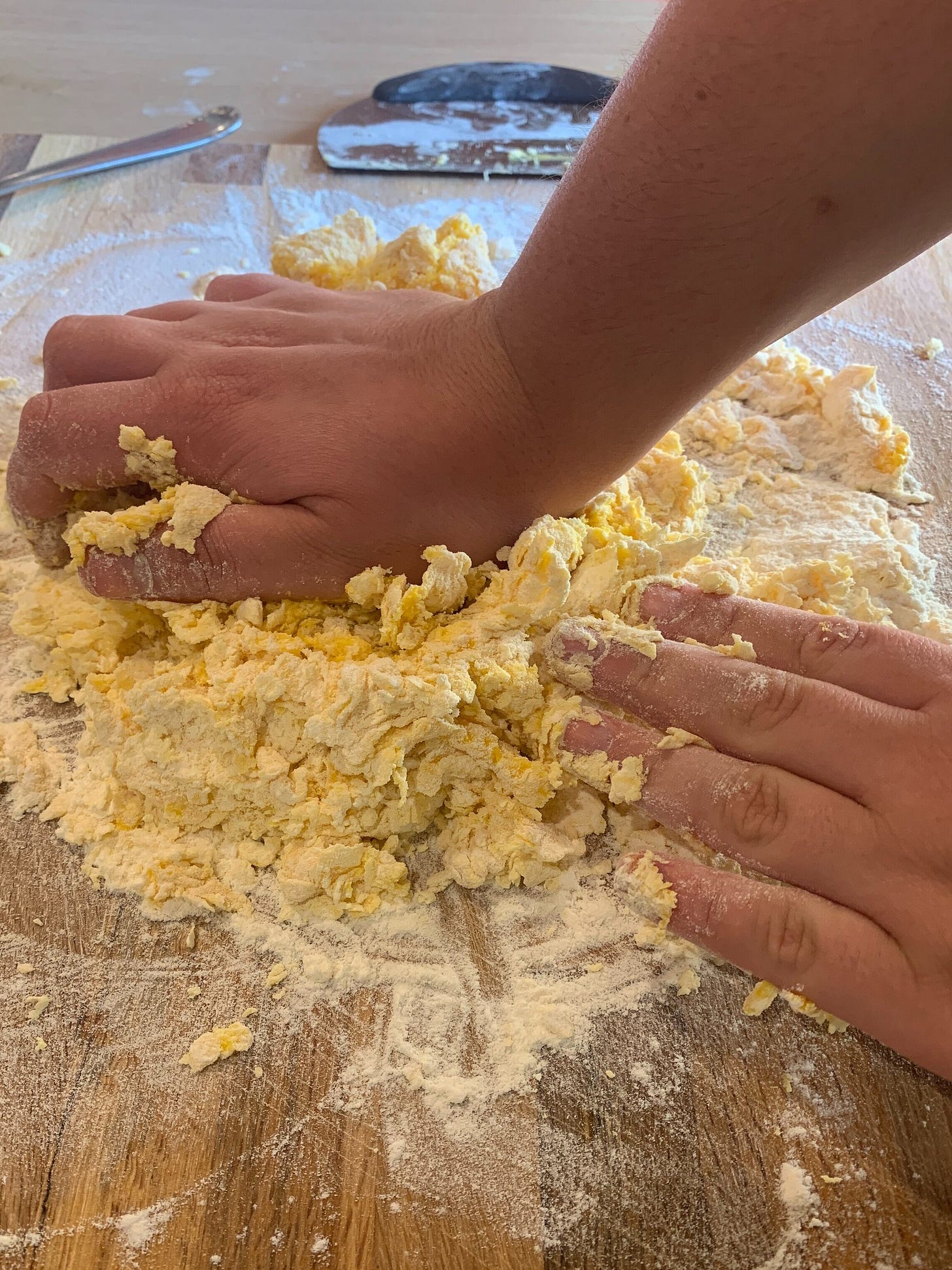
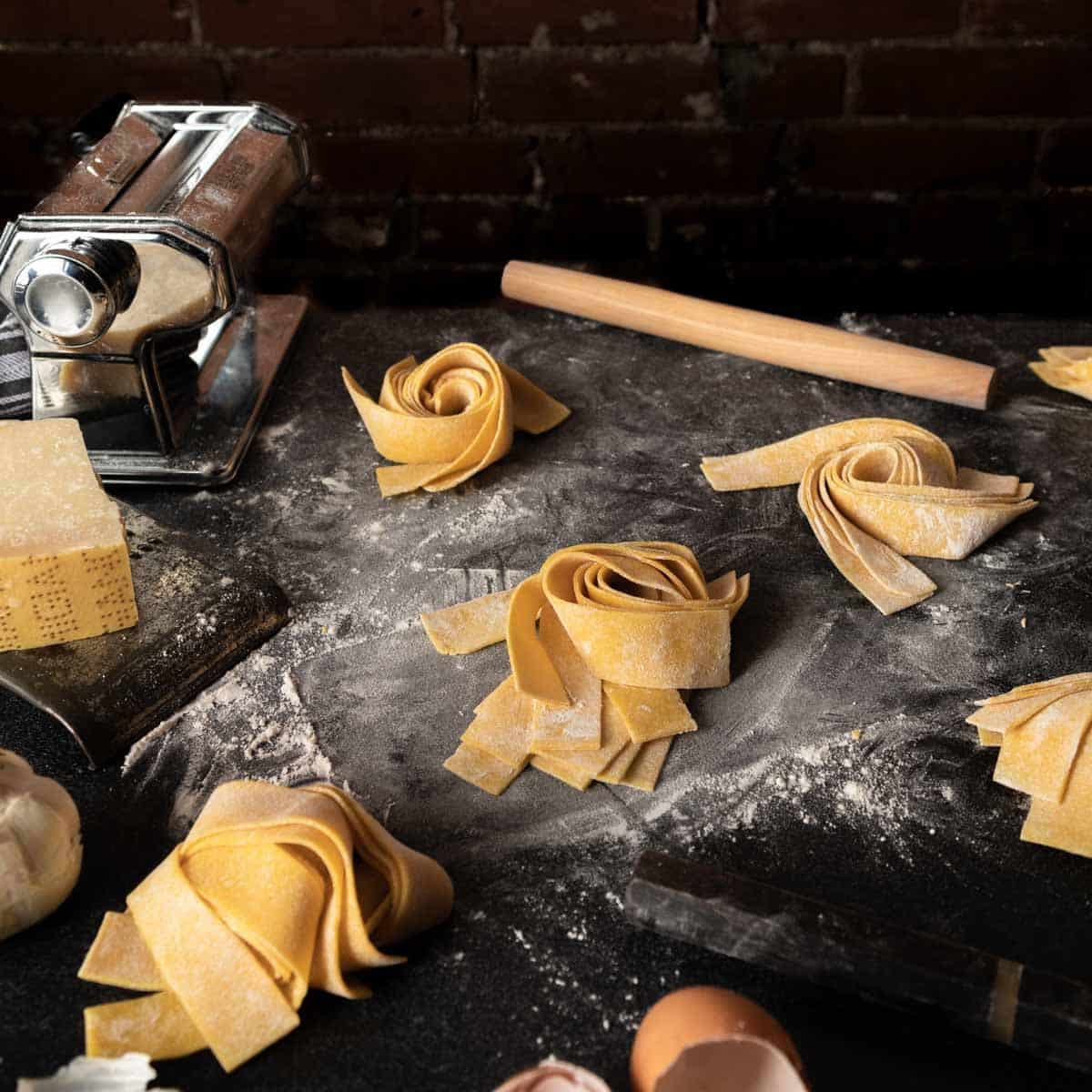
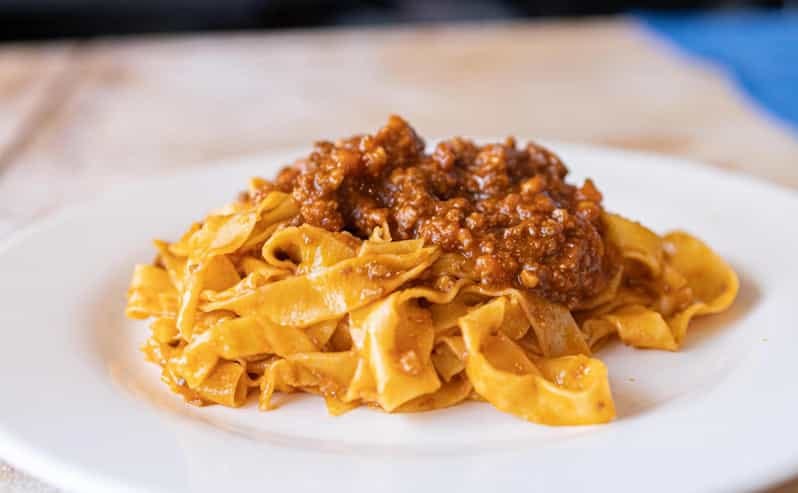
I can almost taste it….